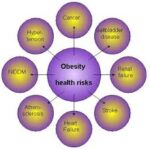 Obesity is one of the greatest public health challenges of the 21st century and is also one of the largest contributing factors to chronic disease and ill health in the world. In Europe alone rates have tripled since the 1980s and in Ireland over 60% of the population is either overweight or obese. Furthermore, weight gain and obesity is now evident in children as young as 3 years of age.
Obesity is one of the greatest public health challenges of the 21st century and is also one of the largest contributing factors to chronic disease and ill health in the world. In Europe alone rates have tripled since the 1980s and in Ireland over 60% of the population is either overweight or obese. Furthermore, weight gain and obesity is now evident in children as young as 3 years of age.
Environment and obesity
There are several reasons for the worrying increase, one of which is the cultivation of an ‘obesogenic environment’. This is where unhealthy food is encouraged and physical activity discouraged. With the rapid advances in technology and the internet, social networking and computer games – both adults and children are more likely found in front of a screen than taking a walk or playing football in their spare time. Excessive TV watching actually lowers a person’s basal metabolic rate (BMR) as the complete inactivity is similar to a trance like state.
Super size me
As well as portion sizes increasing over the years, fast food outlets offer ‘super-size’ options, free toys with meals and other powerful advertising and marketing campaigns aimed at children. These can be difficult for parents to refuse . The global food industry is a powerful machine with the range and choice of cheap, processed ‘convenience’ foods increasing all the time. Busy working mothers may find it easier to put a frozen pizza or ready meal into the oven than prepare a meal from scratch using fresh, nutritious, whole food ingredients.
A global problem
The increase in rates happens outside the wealthier European countries also. Globalisation has meant poorer countries move up the income scale and gain improved access to other foods. The means a move away from their more traditional diet high in grains, fruit and vegetables to the average Western diet which is high in sugar and fatty, processed foods.
Expanding waists
Studies have shown that the heavier people become the more likely they are to underestimate their weight. A larger waistline is now the new ‘normal’ and overweight people can have a distorted perception of their size. The word obese also carries an extreme connotation which can be frightening for people to admit to. It may seem insurmountable to them if the problem is acknowledged. There is a fear that the only solution may be surgery, drugs or extreme dieting.
40+
Studies have also shown that those over 45 can be more prone to overweight. Why is this? Well life can simply get in the way for many and family or work pressures and obligations can leave no time for exercise or addressing dietary issues. Women may also carry baby weight that they never quite lose that increases with each child. In addition to this, a person’s metabolic rate naturally decreases as they get older meaning they have a lower calorie requirement. Food intake must be adjusted to prevent weight gain. Muscle tone also drops when people reach their 40s. This mean muscle mass is lost. This can be corrected with resistance training but if it is not then again, calories requirements drop. It is here that dietary changes help to prevent weight gain.
65+
Levels of overweight can then decrease in the over 65’s. Again the reasons for this can be many and varied. People in their late sixties are most likely retired with more time to dedicate to their health or to take some exercise. Their hunger levels may naturally drop as part of the aging process. Their sense of smell and taste can become dulled which can decrease appetite and the appeal of food. The wearing of dentures or effects of prescription medication can make eating uncomfortable or less desirable. A widowed person living alone may find their motivation for preparing and eating a meal is affected. Decreasing mobility also makes it more difficult to shop for groceries.
Obesity is a complex issue
The issue of weight gain and obesity is a complex one. It is rarely solely a matter of excess calories. It is a combination of social and economic factors, genetics, age, insufficient sleep and poor motivation. This is all compounded by a lack of understanding of what a healthful diet should actually comprise of. This is understandable, there is a wealth of conflicting dietary advice online.
If you would like nutritional support, or advice about testing, call us on 01 4020777 or book online now.

